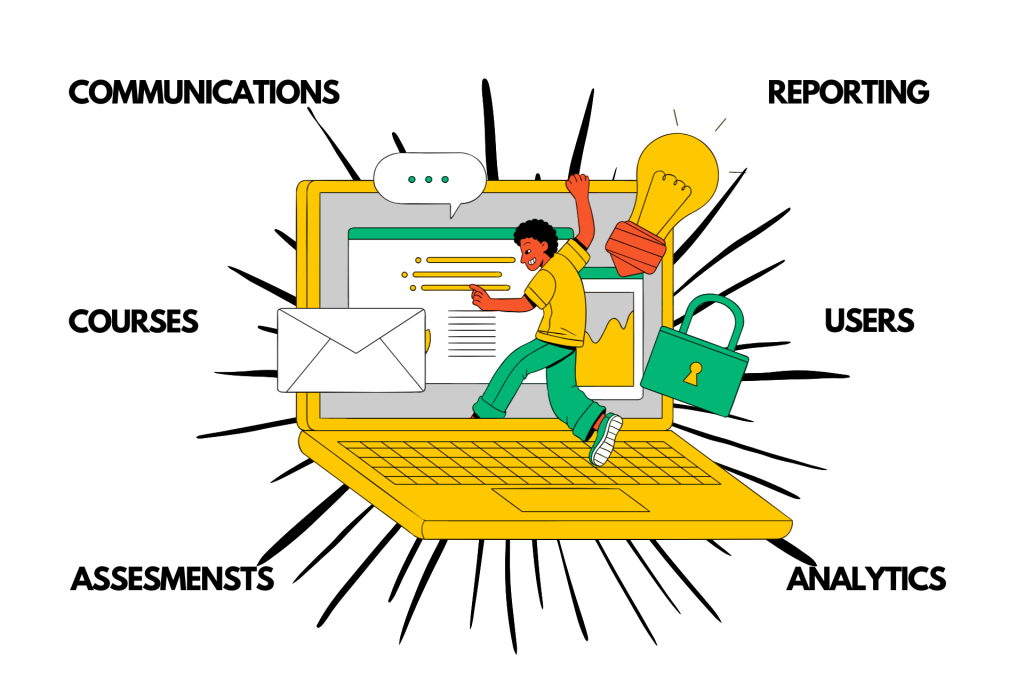In the rapidly evolving landscape of education, the dawn of technology has been a game-changer. Learning Management Systems (LMS) have emerged as powerful tools that seamlessly integrate education with technology, revolutionizing the way we approach learning and training. Our comprehensive guide explores the multifaceted role and impactful influence of Learning Management Systems in modern education.
Understanding Learning Management Systems
Defining LMS
At its core, a Learning Management System (LMS) is a software application designed to manage, deliver, and track educational content. It serves as a centralized hub for administrators, instructors, and learners to interact with course materials, assessments, and communication tools in a virtual environment.
Key Components of LMS

1. Course Management:
LMS allows for the creation, organization, and administration of courses. Instructors can upload content, set assignments, and monitor student progress.
2. User Management:
It provides administrators with tools to manage user access, roles, and permissions, ensuring a secure and controlled learning environment.
3. Assessment and Grading:
LMS facilitates the creation of quizzes, tests, and assignments. It automates grading processes, providing timely feedback to learners.
4. Communication Tools:
LMS platforms often include discussion forums, messaging systems, and collaborative tools to foster communication and interaction among learners and instructors.
5. Analytics and Reporting:
Robust LMS systems offer analytics features, allowing administrators to track user engagement, assess the effectiveness of courses, and make data-driven improvements.
Types of Learning Management Systems
Cloud-Based LMS:
- Hosted on external servers, providing accessibility from any location with internet connectivity.
- Offers scalability and flexibility, making it suitable for various institutions and organizations.
Open-Source LMS:
- Allows users to modify and customize the source code according to their specific needs.
- Offers a high degree of flexibility but requires technical expertise for implementation and maintenance.
Corporate LMS:
- Tailored for businesses to manage employee training and development.
- Emphasizes features like compliance tracking, skills development, and performance management.
Educational LMS:
- Specifically designed for academic institutions, from K-12 to higher education.
- Focuses on features such as gradebooks, course calendars, and integration with academic systems.
Integrated LMS:
- Seamlessly integrates with other tools and platforms, such as content management systems (CMS) and video conferencing tools.
- Streamlines the learning experience by centralizing various educational resources.
The Role of Learning Management Systems
Enhanced Accessibility:
- LMS facilitates 24/7 access to learning materials, allowing learners to study at their own pace and convenience.
- Particularly beneficial for remote or online learning scenarios.
Streamlined Administration:
- Simplifies administrative tasks, including course creation, user management, and grading.
- Frees up instructors’ time, allowing them to focus on creating engaging and effective learning content.
Personalized Learning Paths:
- LMS enables the customization of learning paths based on individual needs and progress.
- Learners can navigate through courses at their own speed, ensuring a personalized and adaptive learning experience.
Collaborative Learning Environment:
- Communication tools within LMS foster collaboration among learners and instructors.
- Discussion forums, chat features, and collaborative assignments promote engagement and interaction.
Data-Driven Decision-Making:
- Analytics and reporting features provide valuable insights into learner engagement, course effectiveness, and areas for improvement.
- Administrators can make informed decisions to enhance the overall learning experience.
The Impact of Learning Management Systems
Flexibility and Convenience:
- LMS has democratized education by breaking down geographical barriers.
- Learners can access educational content from anywhere, fostering inclusivity and accessibility.
Cost-Efficiency:
- Reduces the costs associated with traditional classroom-based learning, such as printed materials, physical space, and travel expenses.
- Offers a scalable solution for institutions with varying enrollment sizes.
Scalability:
- Accommodates the needs of both small-scale educational programs and large enterprises.
- Can easily scale to meet the growing demands of an expanding user base.
Improved Learning Outcomes:
- Personalized learning paths and adaptive assessments contribute to improved learning outcomes.
- Learners can revisit and review materials as needed, reinforcing understanding and knowledge retention.
Professional Development and Training:
- In a corporate setting, LMS plays a crucial role in employee training and development.
- Allows organizations to deliver consistent training programs across diverse teams and locations.
Conclusion
In conclusion, Learning Management Systems have evolved into indispensable tools that redefine the educational experience. From flexible and accessible learning environments to streamlined administration and data-driven decision-making, LMS has left an indelible mark on modern education. As technology continues to advance, the role and impact of Learning Management Systems will likely expand, shaping the future of learning across various sectors and industries. Embracing and leveraging these systems is not just an option; it’s a strategic move towards creating a more efficient, inclusive, and impactful learning ecosystem.

Leave a Reply